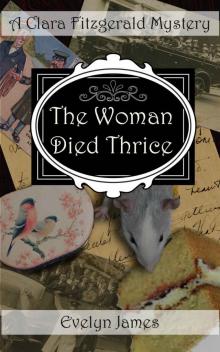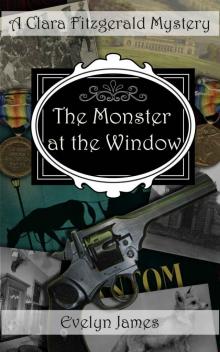- Home
- Evelyn James
The Poison Pen Page 3
The Poison Pen Read online
Page 3
“When did this arrive?”
“Over a month ago. I believe it was something like the third or fourth day of January.”
“It came by post?”
“Yes.”
Clara examined the letter again, not reading the words, but assessing the style of the writing.
“It looks like the same hand that wrote Mrs Wilton’s letter.”
“That’s what I thought,” Mrs Wilton said.
“Who would know about your Thursday night arrangement?” Clara enquired.
“My friends, of course, and I suppose their husbands and perhaps their servants if they have any. They may have mentioned it to other friends and I suppose anyone who lives in this road must see them come to my house.”
“And would the same apply to your husband’s visits to the Conservative Club?”
“Yes, and all his friends at the club know about his visits, naturally. I suppose quite a few people would know of it.”
“Hmm,” Clara said softly. “This ‘provincial’ business, what is that about?”
“I was born on a farm not far outside Hove. My father was a respectable businessman with 100 acres to his name. My brother inherited the farm and has since added another fifty acres. I suppose, technically, I am of provincial stock, but I resent the implication that I am some country lass who has risen above her station in life,” Mrs Hampton huffed. “Quite frankly, it was that part of the letter that annoyed me the most.”
“Well, thank you for your time ladies. I shall update you as soon as I am able.” Clara carefully placed Mrs Hampton’s letters with the others and rose from her seat.
“Thank you again Miss Fitzgerald. We must find this rogue at once. It is really quite despicable.” Mrs Hampton followed her to the door, “I hope to see you soon.”
Mrs Wilton left the house with Clara and for a while they walked together.
“Tell me, Mrs Wilton, of the people we met tonight, are any of them likely to have secrets they might fear being exposed?”
“Oh!” Mrs Wilton was genuinely startled by the question. “I suppose it is possible. I mean, everyone has secrets. If you ask me the Summertons have something to hide. They arrived here about five years ago and I have yet to hear any hint of their life before Brighton. It is quite the mystery.”
Clara nodded.
“Anyone else?”
Mrs Wilton gave the question some thought.
“Mr Johnson is a very quiet soul, and I do sometimes wonder if he might have a few skeletons in the closet.”
“I am seeing him on Friday, I believe,” Clara replied. “Works as a salesman for an agricultural goods firm, doesn’t he?”
“Yes. Travels a great deal. No wife, no sign of a family.”
Clara filed this away in her memory.
“Well good night Mrs Wilton, if anything further springs to mind you know where to call on me.”
“Yes, indeed. I am so glad you are on the case Clara!” Mrs Wilton gave a wave and hurried off to her home.
Clara wandered in the dark for a while thinking about what drove a person to write such ghastly letters. She doubted they were a very happy person. But if they thought they could elude Clara, well… they would soon discover they were very wrong.
Chapter Four
Clara had arranged her first interview with one of the poison pen victims for the following afternoon, so when she awoke on Tuesday morning, she decided to pay a call on former Constable Brompton at the hospital. Tommy was in the parlour as she hurried to leave.
“What was all that business with the Inspector?” he called out as she started to vanish.
“He thinks he has a corrupt policeman in his midst,” Clara answered.
Tommy looked genuinely surprised.
“Anything I can do?”
Clara had started to dash off again, but then she paused.
“The library opens on Tuesday, doesn’t it?”
“Yes,” Tommy agreed.
“And they keep copies of the local newspaper in their archives, for reference?”
“I believe so.”
“Could you go take a look at the reports of a drunk driver hitting Constable Brompton last summer? There might be something in them. Oh, and see if you can find some of those criminal psychology books you like to go on about from America. I want to know what motivates a person to write poison pen letters.”
Tommy gave her a half-smile.
“As ever, you can’t just be happy with one case.”
Clara shrugged.
“Well, it keeps me busy,” then she was dashing out the door.
Clara had not been back to the general hospital since she had worked there during the war. She had left the building for the last time in June 1918 to anticipate the return of her crippled brother, and had been very glad to leave it behind. Clara was not a natural nurse; blood made her queasy and she tended to get very upset when a patient died. Some of the more experienced (Clara referred to them as hard-hearted) nurses were very disapproving and had made her feel distinctly inadequate. Clara felt they had unfairly expected her to be as proficient and immune to suffering as themselves. It was the children that shook her most, and for a long time afterwards she had suffered from nightmares concerning infants with missing limbs or youngsters drenched in blood.
She had wondered how being back at the hospital now would affect her but, strangely, as she looked up at the gaunt building, she did not feel particularly alarmed or upset. It was as though she had stowed all that emotion away into some back corner of her mind. Now she just saw a building busily occupied with the mundane accidents and illnesses that occur to people in peacetime.
After a few enquiries, Clara was escorted into the basement of the building, where a large room was devoted to keeping track of patient records. She was introduced to the man in charge, Mr Brown, and left in his capable hands. Mr Brown was around sixty with carefully preened hair and a sergeant-major moustache. He wore a serviceable, but clearly well-used, dark brown suit and had a thick pair of glasses propped on his nose. He gave Clara a tour of the filing room with obvious pride.
The large basement area consisted of rows and rows of wooden filing cabinets, illuminated by several electric lights that had the bad habit of flickering at random moments. The staff consisted of three people; Brown, Miss Peeble and James Brompton. Miss Peeble worked largely at a black typewriter, typing up the scribbled doctors’ notes that were sent down to her and sorting the correct papers into the patients’ files. She was kept extremely busy and was a dab-hand at translating the cryptic scrawl doctors are renowned for using on their most important notes.
James Brompton was considered the most junior clerk in the filing room and, Mr Brown confided quietly, was likely to remain that way. His role, though relatively simple, was vital for keeping the filing room in good order. Each morning, James would come into the room and find patient files on his desk ready to be organised into the alphabetical filing system. He would take the top folder and create a label for it which would help when it came to finding it again. Once the label was glued to the folder he would check the contents of the file to ensure nothing was missing. It rarely was, Mr Brown assured Clara, for Miss Peebles was a stickler for detail and had been known to run down a doctor who had failed to fill in all the patient forms correctly. James would then place the folder into its relevant cabinet, based on the patient name. At any point during the course of the day messages would be sent down requesting a patient file and it was James’ duty to retrieve the file and take it to the relevant doctor.
“In some cases, that can be quite challenging. Say, for instance, we have a number of patients with the same name, knowing which one to pick is impossible and you have to take the whole lot to the doctor to make sure you have the correct one,” Mr Brown gave a sigh. “Doctors expect us to work miracles down here. They ask for a file on Mrs King, well, we have ten Mrs Kings on file at least. So you ask if they could be more specific and they say something like, ‘oh she
was the one with the usual case of gout’. As you can imagine, we are kept very busy.”
Clara nodded, looking about the corridors of filing cabinets.
“How long do you keep patient files for?” she asked.
“Now there is a question!” Mr Brown chuckled to himself, as if Clara had stumbled on some secret joke. “We keep a patient’s notes throughout their lifetime; never know when you might need them. But we originally planned on destroying the relevant notes after the patient was deceased, however, the doctors complained, said you never could tell when you might want to refer back to an old case for help on a new one. So we don’t destroy any of them anymore. Our oldest files are from the 1870s when the administrator of the hospital first started record keeping.”
“Impressive,” Clara said, knowing a man who liked to be praised for his humble work when she saw one. “You will need more space soon.”
“Oh, I dare say they will open another basement section for us,” Mr Brown shrugged, untroubled by the thought. “You know, we have people come from hospitals all over the country to admire our filing system. Many hospitals still don’t bother at all to keep records. I really don’t know how they manage.”
“Quite,” Clara wondered if somewhere in this valley of files there was one marked C. Fitzgerald. “Might I speak to James now?”
“Why, of course, I have delayed you so long. He is over there, working on the morning’s files,” Mr Brown showed Clara to a desk in the centre of the basement where a young man was neatly filling in a small card label, half-hidden behind a stack of brown folders. “James, this is Miss Fitzgerald.”
James Brompton stood and held out a hand to Clara. She shook it with a smile.
“Inspector Park-Coombs asked that I would pop in and check on you,” Clara explained.
“James, why don’t you go for an early tea break? Then you can chat with Miss Fitzgerald in private.”
James grinned at his boss, clearly pleased with the notion of an early pause from his work at the desk.
“This way, Miss Fitzgerald,” he said to Clara, easing his way around the desk, past a large filing cabinet, and leading her to a small room at the far side of the basement.
It was barely bigger than a large cupboard, but the room had been furnished with a sink and a kettle, and one rather battered kitchen chair. Behind a door at the very end, Clara glimpsed a toilet. The filing department was self-contained and need not venture upstairs for anything unless asked. James motioned her to take the chair and upturned a metal bucket for himself. He took two cups off a shelf and began to warm the kettle on a small stove ring squashed between the sink and the wall.
“Is the Inspector worried about me?” he asked, a frown crossing his rather innocent face.
“No, not at all. He just wanted me to drop by and see that you were doing all right and were happy.”
“Oh yes miss, I am quite happy.”
Clara took a good look at the young man before her. He was about twenty-five, tall and lanky, with fair, unruly hair that fluffed up in curls around his ears. He had bright blue eyes, which shone with a child-like delight for life, and he rarely lost the smile from his face. Clara found herself thinking of him as a five-year-old child in an adult’s body. He had that innocent and wondering look one associates with the very young, but not with a grown man who was formerly a police constable. Clara was beginning to understand what the Inspector had meant about Brompton being no longer suitable for police work. His peaceful nature made her balk at having to raise the spectre of his accident before him. Fortunately, Brompton offered her an opening on the subject.
“The Inspector worries an awful lot since I had my accident,” Brompton rather stiffly lowered himself onto the bucket, a slight grimace crossing his face as he bent his knees.
“Yes, he mentioned you were in an accident. Was it long ago?”
“Last summer, I think,” James scratched at the curls over his left ear, ruffling them further, “The Inspector would know. Time is all rather hazy after that. I am dreadful with dates. Sometimes I get up on a Sunday morning and try to come to work, and my mother has to stop me!”
James gave an amused laugh at his own failings.
“What sort of an accident was it?” Clara asked casually.
“Oh, a road accident. Drunk driver, or so they said. They never caught him.”
“What happened?”
“I was a policeman back then,” James grinned. “I quite liked that too. I used to walk all over the place keeping an eye out for trouble. I had a whistle to blow if I needed help, and a truncheon. I was patrolling the lanes outside Hove. There isn’t much about there, but there are a few farms. I had a torch if I needed it, but mostly I just followed my feet and watched the stars. It was very peaceful. I was walking down Beggar’s Lane, I remember that well enough, which is odd considering all the other stuff I forget. I think I heard the car, but a little too late. I suppose it hit me. At least, that’s what they say.”
“You don’t remember anything else?”
“No,” the kettle behind James began to whistle and he stood to pour hot water into the teapot. His eyes alighted on the two cups standing nearby and a look of confusion spread over his face.
Clara noticed.
“You were making me a cup of tea too,” she said.
“Ah, yes,” James’ face relaxed and his smile returned. “I wondered why there were two cups. That’s the sort of problem I have all the time.”
He sat down again and absently leaned back as if in the chair Clara was occupying. Fortunately, the sink was behind him, and his shoulders came against it before he ended up on the floor.
“And after the accident James? What happened then?”
“Do you mean my road accident?” James had lost the thread of the conversation.
“Yes, I do. Did you wake up in the hospital?”
“Yes, this one,” James pointed upwards with a finger to indicate the hospital above them. “My head hurt something awful and my legs. They say I was lucky to walk again. The car must have been coming at a fair lick to injure me like that, that’s what the Inspector said, must have been coming at a fair lick. My head’s not been right since. I forget things a lot. Mother gets upset about it, but father says she should be happy she still has a son. Lots of people don’t, you know, because of the war.”
Clara wondered if there was any point trying to ask James whether someone in the police force wished him harm. Would James even remember such a thing, assuming he had noticed at the time?
“Inspector Park-Coombs is still trying to find the man who knocked you down,” she hedged around the topic. “Do you ever give any thought as to who it might have been?”
“No,” James shrugged.
“What of your fellow constables? Do any of them visit you?”
James pulled a strange face; it was not so much confusion as anger, mingled with disgust. For a second Clara thought she had hit on something. Then he relaxed.
“No. I don’t see any of them,” James stood and began to pour out tea.
“I thought you might have had friends among the force,” Clara tried, hoping to stir whatever memory had caused his strange expression.
“I think I used to,” James said. “Sometimes I think I did, then other times I am not so sure.”
“Were there people you didn’t get on with then?”
James handed her a cup of tea.
“Maybe. I somehow feel there was but… I can’t remember,” James screwed up his face, the difficulty he was having trying to remember things for Clara was upsetting him.
Clara decided she should not press him further for the moment.
“Never mind, James. Here is my card, perhaps if you do remember anything you could contact me,” She pulled out one of her business cards from her handbag and passed it to him.
“I like labels,” James said, examining the card with great care. “I don’t always remember names these days, but labels I can read. People send down note
s with names on for me to find, I can do that because the name is written down. It’s very helpful because I would just forget otherwise. Thank you, Miss Fitzgerald, I’ve never had a card like this before.”
Clara smiled at him, such an innocent in a man’s body. She wasn’t sure whether to feel sorry for him or not. In some ways he was truly content, in a manner most people rarely achieved.
“I ought to be going,” she drained her tea, which was quite ghastly, and placed the cup on the side. “Thank you for speaking to me James.”
The lad grinned.
“Come again, if you want,” he said.
Clara threaded her way through the filing cabinets and found Mr Brown by his desk at the door. He looked up with a thoughtful smile.
“Was that helpful Miss Fitzgerald?”
“In a way,” Clara sighed. “I can’t help thinking how cruel life is. How in just a moment a promising career can be swept away and a man changed forever.”
“Yes, I suppose you could see it like that. But at least James is still with us.”
“There is that.”
Mr Brown offered to show her the way out of the basement. Clara gladly accepted, not wishing to become lost in the many corridors and rooms of the hospital. Outside again she said goodbye to Mr Brown and wrapped her coat tightly around her in the February breeze. She had half an hour to spare before her first interview with a poison pen victim. She decided a brisk walk would fill the time adequately and perhaps burn off some of that cake she had eaten the night before. Clara strode out onto the pavement, her thoughts still on James Brompton.
Chapter Five
Annie negotiated the front steps of the library with Tommy’s wheelchair, and deposited him in the main reading room.
“There you are. I shall be back in a couple of hours after I have done the shopping,” she squeezed his hand and vanished back out the door.

 The Woman Died Thrice
The Woman Died Thrice The Poison Pen
The Poison Pen The Fossil Murder
The Fossil Murder The Green Jade Dragon
The Green Jade Dragon Murder on the Mary Jane
Murder on the Mary Jane Murder and Mascara
Murder and Mascara Mr Lynch's Prophecy
Mr Lynch's Prophecy The Traitor's Bones
The Traitor's Bones The Valentine Murder
The Valentine Murder Death at the Pantomime
Death at the Pantomime The Cowboy's Crime
The Cowboy's Crime The Trouble With Tortoises
The Trouble With Tortoises The Monster at the Window
The Monster at the Window